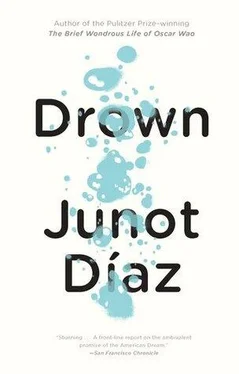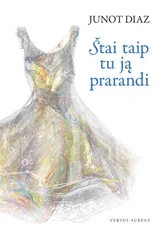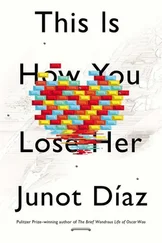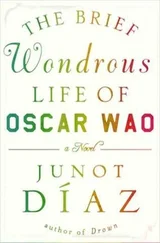Without Abuelo around, me and Rafa did anything we wanted. Mostly Rafa hung out with his friends and I played with our neighbor Wilfredo. Sometimes I climbed trees. There wasn’t a tree in the barrio I couldn’t climb and on some days I spent entire afternoons in our trees, watching the barrio in motion and when Abuelo was around (and awake) he talked to me about the good old days, when a man could still make a living from his finca, when the United States wasn’t something folks planned on.
Mami came home after sunset, just when the day’s worth of drinking was starting to turn some of the neighbors wild. Our barrio was not the safest of places and Mami usually asked one of her co-workers to accompany her home. These men were young, and some of them were unmarried. Mami let them walk her but she never invited them into the house. She barred the door with her arm while she said good-bye, just to show them that nobody was getting in. Mami might have been skinny, a bad thing on the Island, but she was smart and funny and that’s hard to find anywhere. Men were drawn to her. From my perch I’d watched more than one of these Porfirio Rubirosas say, See you tomorrow, and then park his ass across the street just to see if she was playing hard to get. Mami never knew these men were there and after about fifteen minutes of staring expectantly at the front of our house even the loneliest of these fulanos put their hats on and went home.
We could never get Mami to do anything after work, even cook dinner, if she didn’t first sit awhile in her rocking chair. She didn’t want to hear nothing about our problems, the scratches we’d put into our knees, who said what. She’d sit on the back patio with her eyes closed and let the bugs bite mountains onto her arms and legs. Sometimes I climbed the guanábana tree and when she’d open her eyes and catch me smiling down on her, she’d close them again and I would drop twigs onto her until she laughed.
2.
When times were real flojo, when the last colored bill flew out Mami’s purse, she packed us off to our relatives. She’d use Wilfredo’s father’s phone and make the calls early in the morning. Lying next to Rafa, I’d listen to her soft unhurried requests and pray for the day that our relatives would tell her to vete pa’l carajo but that never happened in Santo Domingo.
Usually Rafa stayed with our tíos in Ocoa and I went to tía Miranda’s in Boca Chica. Sometimes we both went to Ocoa. Neither Boca Chica nor Ocoa were far but I never wanted to go and it normally took hours of cajoling before I agreed to climb on the autobus.
How long? I asked Mami truculently.
Not long, she promised me, examining the scabs on the back of my shaved head. A week. Two at the most.
How many days is that?
Ten, twenty.
You’ll be fine, Rafa told me, spitting into the gutter.
How do you know? You a brujo?
Yeah, he said, smiling, that’s me.
He didn’t mind going anywhere; he was at that age when all he wanted was to be away from the family, meeting people he had not grown up with.
Everybody needs a vacation, Abuelo explained happily. Enjoy yourself. You’ll be down by the water. And just think about all the food you’ll eat.
I never wanted to be away from the family. Intuitively, I knew how easily distances could harden and become permanent. On the ride to Boca Chica I was always too depressed to notice the ocean, the young boys fishing and selling cocos by the side of the road, the surf exploding into the air like a cloud of shredded silver.
Tía Miranda had a nice block house, with a shingled roof and a tiled floor that her cats had trouble negotiating. She had a set of matching furniture and a television and faucets that worked. All her neighbors were administrators and hombres de negocios and you had to walk three blocks to find any sort of colmado. It was that sort of neighborhood. The ocean was never far away and most of the time I was down by the beach playing with the local kids, turning black in the sun.
Tía wasn’t really related to Mami; she was my madrina, which was why she took me and my brother in every now and then. No money, though. She never loaned money to anyone, even to her drunkard of an ex-husband, and Mami must have known because she never asked. Tía was about fifty and rail-thin and couldn’t put anything in her hair to make it forget itself; her perms never lasted more than a week before the enthusiasm of her kink returned. She had two kids of her own, Yennifer and Bienvenido, but she didn’t dote on them the way she doted on me. Her lips were always on me and during meals she watched me like she was waiting for the poison to take effect.
I bet this isn’t something you’ve eaten lately, she’d say.
I’d shake my head and Yennifer, who was eighteen and bleached her hair, would say, Leave him alone, Mamá.
Tía also had a penchant for uttering cryptic one-liners about my father, usually after she’d downed a couple of shots of Brugal.
He took too much.
If only your mother could have noticed his true nature earlier.
He should see how he has left you.
The weeks couldn’t pass quickly enough. At night I went down by the water to be alone but that wasn’t possible. Not with the tourists making apes out of themselves, and with the tígueres waiting to rob them.
Las Tres Marías, I pointed out to myself in the sky. They were the only stars I knew.
But then one day I’d walk into the house from swimming and Mami and Rafa would be in the living room, holding glasses of sweet lemon-milk.
You’re back, I’d say, trying to hide the excitement in my voice.
I hope he behaved himself, Mami would be saying to Tía. Her hair would be cut, her nails painted; she’d have on the same red dress she wore on every one of her outings.
Rafa smiling, slapping me on the shoulder, darker than I’d last seen him. How ya doing, Yunior? You miss me or what?
I’d sit next to him and he’d put his arm around me and we’d listen to Tía telling Mami how well I behaved and all the different things I’d eaten.
3.
The year Papi came for us, the year I was nine, we expected nothing. There were no signs to speak of. Dominican chocolate was not especially in demand that season and the Puerto Rican owners laid off the majority of the employees for a couple of months. Good for the owners, un desastre for us. After that, Mami was around the house all the time. Unlike Rafa, who hid his shit well, I was always in trouble. From punching out Wilfredo to chasing somebody’s chickens until they passed out from exhaustion. Mami wasn’t a hitter; she preferred having me kneel on pebbles with my face against a wall. On the afternoon that the letter arrived, she caught me trying to stab our mango tree with Abuelo’s machete. Back to the corner. Abuelo was supposed to make sure I served my ten minutes but he was too busy whittling to bother. He let me up after three minutes and I hid in the bedroom until he said, OK, in a voice that Mami could hear. Then I went to the smokehouse, rubbing my knees, and Mami looked up from peeling platanos.
You better learn, muchacho, or you’ll be kneeling the rest of your life.
I watched the rain that had been falling all day. No, I won’t, I told her.
You talking back to me?
She whacked me on the nalgas and I ran outside to look for Wilfredo. I found him under the eaves of his house, the wind throwing pieces of rain onto his dark-dark face. We shook hands elaborately. I called him Muhammad Ali and he called me Sinbad; these were our Northamerican names. We were both in shorts; a disintegrating pair of sandals clung to his toes.
What you got? I asked him.
Boats, he said, holding up the paper wedges his father had folded for us. This one’s mine.
Читать дальше












